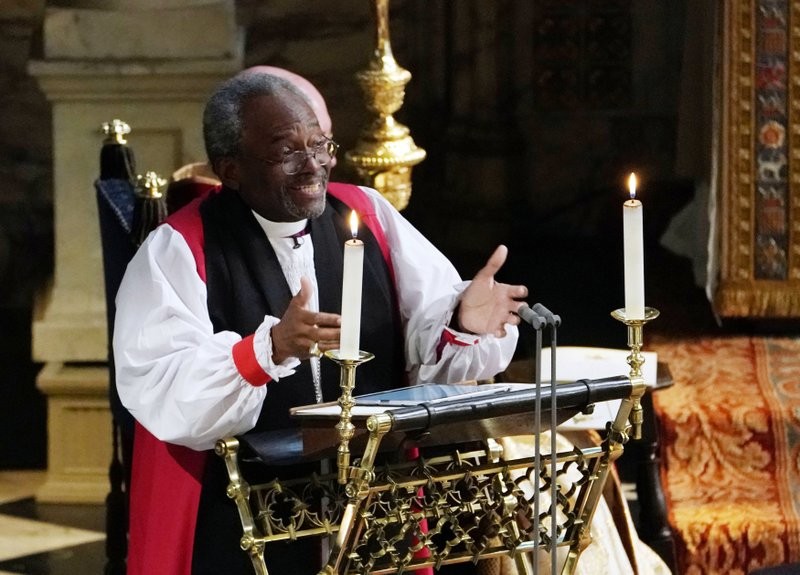WINDSOR, England (AP) — Nothing quite captured the trans-Atlantic nature of Saturday’s royal wedding as much as the guest preacher whose sermon brought American flair to a very English church service.
The Most Rev. Michael Bruce Curry, the first black leader of the Episcopal Church in the United States, was hand-picked by Prince Harry and Meghan Markle to address their 600 wedding guests.
The bishop’s sermon on the theme of love, delivered with energy and studded with quotes from the bible, Martin Luther King Jr. and African-American spirituals, was a contrast to the more solemn Anglican style the royal family is used to.
Quoting civil rights icon King on the “redemptive power of love,” Curry told the bride and groom “it’s not just for, and about, a young couple who we rejoice with, it’s more than that.”
Many observers were surprised and delighted. BBC broadcaster Jeremy Vine tweeted: “The preacher is doing 50 in a 30 zone and it’s brilliant.”
Supermodel Naomi Campbell hit Caps Lock and tweeted: “BISHOP MICHAEL CURRY GIVING ME LIFE.”
Curry, who like Markle’s mother has African ancestors who were slaves in the U.S., said that even during their time of bondage, love helped those in captivity persevere.
“When love is the way, we actually treat each other, well, like we are actual family,” he said in a sermon that touched on poverty, inequality and the healing power of love.
“When love is the way, we know that God is the source of us all and we are brothers and sisters, children of God and brothers and sisters,” he said. “That’s a new heaven, a new earth a new world, a new human family.”
Harry and Markle exchanged a quick glance at one point as Curry drifted from his prepared remarks and ad-libbed. Camilla and Kate — the Duchess of Cornwall and the Duchess of Cambridge — traded sidelong glances.
Queen Elizabeth II, who as monarch holds the title of Supreme Governor of the Church of England, did not show any sign of discomfort and looked as stoic as she had through the entire ceremony.
There may have been a touch of royal relief when Curry quipped “We gotta get y’all married now.” But he kept going, bringing a dash of passion to the pulpit.
The crowds waiting outside for a glimpse of the royal couple loved it. Cheers greeted Curry as he walked uphill from the chapel along the procession route after the service. One man shouted “well done” — prompting a smile and “God bless you” from the bishop.
Former Labour Party leader Ed Miliband, an atheist, tweeted: “Rev Michael Curry could almost make me a believer.”
The Episcopal Church is an offshoot of the Church of England in the United States and has been the spiritual home of many of the American founding fathers and U.S. presidents.
Even though its support for gay marriage has recently caused friction with the greater Anglican Communion, Archbishop of Canterbury Justin Welby said ahead of the ceremony that he was “thrilled” Curry would be speaking there, calling him a “stunning preacher.”
Curry, 65, who is married and has two grown daughters, was born in Chicago and raised in Buffalo, New York. He began his ministry in Winston-Salem, North Carolina and served as rector in Lincoln Heights, Ohio and Baltimore, Maryland.
Selecting him to give the sermon was one of several personal touches Harry and Meghan put on the service, held in the 15th century St. George’s Chapel at Windsor Castle.
Markle, who attended a Roman Catholic school, was baptized in March into the Church of England in preparation for the wedding and joining the royal family.
The ceremony was based on Common Worship — the most modern of several Church of England service options — and included prayers and hymns, as well as readings and musical selections chosen by the couple and their families.
That included a fusion of American and British elements, including the London-based gospel ensemble the Kingdom Choir’s stirring renditions of Ben. E. King’s “Stand By Me” and Etta James’ “Amen/This Little Light of Mine.”
Teenage cellist Sheku Kanneh-Mason wowed the 600 guests with works including Franz Schubert’s “Ave Maria.” The cellist won the BBC’s Young Musician of the Year contest in 2016, the first black musician to do so.
For all the individual touches, the service was dominated by tradition.
The pair read the Church of England wedding vows, promising to have and to hold, “for better, for worse, for richer, for poorer, in sickness and in health, to love and to cherish, till death us do part.”
Then the archbishop pronounced them husband and wife.
“Those whom God has joined together let no one put asunder,” he said.




